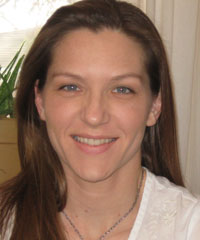Shana K. Carpenter

Iowa State University, USA
http://www.psychology.iastate.edu/~shacarp
What does your research focus on?
I study techniques and strategies that improve memory. My research so far has focused on the effectiveness of relatively simple mnemonic techniques such as retrieval practice, the optimal scheduling of repeated study sessions, and the best time during which corrective feedback should be given in order to maximize the amount of information that people can remember.
What drew you to this line of research? Why is it exciting to you?
It was purely by accident that I became fascinated with learning. When I was younger, I didn’t enjoy school at all. My only interest in learning was to try to become more efficient at it so that I could spend as little time as possible on school work. Trying out different memory tricks and strategies became a fascination — almost an obsession — for years. This led to a very reluctant and surprising realization that I quite enjoyed learning new things.
Who were/are your mentors or psychological influences?
I am fortunate to have had a PhD advisor, Ed DeLosh at Colorado State, who gave me the freedom to explore nearly anything that I wanted to. This instilled a sense of independence that I don’t think I fully appreciated at the time, but that turned out to be great preparation for life in academia. I have benefited greatly from the mentorship and collaborations with Alice Healy and Lyle Bourne at the University of Colorado, Boulder. I am immensely grateful to Hal Pashler for taking me on as a postdoc at UC San Diego and providing opportunities that were incredibly important in the development of my independent research, and to John Wixted for his valued collaborations, advice, and contagious enthusiasm.
To what do you attribute your success in the science?
I don’t think I have achieved a particularly high level of success at this point, but what I have achieved could not have been done without the influences of several important mentors, collaborators, peers, colleagues, and friends who have taken the time to listen and offer their advice, expertise, transparent feedback, reality checks, and a healthy dose of non-work-related conversations.
What’s your future research agenda?
I am excited to be starting some new studies on foreign language learning. I have wanted to do this for a long time, but have always known that it would require a great deal of help from collaborators who have specific expertise that I do not. Through an incredible stroke of luck in recent years, I have crossed paths with a number of incredibly talented interdisciplinary scholars and teachers who share these interests and have turned out to be a fantastic team of collaborators. I very much look forward to working with these folks for years to come.
Any advice for even younger psychological scientists? What would you tell someone just now entering graduate school or getting their PhD?
A lot of people will tell you that it is important to find a research topic that really interests you. I would agree. But how do you find this topic? My advice would be to get involved in something — anything, really — as early as possible. It has been my experience that the perfect idea never comes to you when you’re sitting there trying to think of the perfect idea. Jump into action. Read a lot. Collect some data. Analyze it. Think about it. Talk about it with people. Think about it some more, then go off and read some more. Try to keep the wheels turning, and these habits are likely to pay off.
What publication are you most proud of or feel has been most important to your career?
Carpenter, S. K., & DeLosh, E. L. (2005). Application of the testing and spacing effects to name-learning. Applied Cognitive Psychology, 19, 619-636.
This one is special because it was the first. For a variety of reasons, I have found that it is a good thing to try to remember what it was like to do something for the first time.





APS regularly opens certain online articles for discussion on our website. Effective February 2021, you must be a logged-in APS member to post comments. By posting a comment, you agree to our Community Guidelines and the display of your profile information, including your name and affiliation. Any opinions, findings, conclusions, or recommendations present in article comments are those of the writers and do not necessarily reflect the views of APS or the article’s author. For more information, please see our Community Guidelines.
Please login with your APS account to comment.